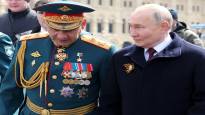MOSCOW President of Russia Vladimir Putin had reserved one small surprise for Sunday evening, when he announced the ministerial appointments for foreign and security policy.
The three main characters switch places. Deputy Prime Minister of the previous government Andrei Belousov becomes Minister of Defense and a long-term Minister of Defense Sergei Shoigu takes over as secretary of the Federal Security Council. Held this position since 2008 Nikolai Patrushev moves on to another task.
The 65-year-old Belousov is known as a competent steward and technocrat. He has advocated mobilizing the Russian economy behind the war.
Belousov’s appointment will probably not satisfy staunch supporters of the war in Russia, who would have hoped for a hard-line soldier.
As an economist, Belousov has no military background, but neither did his predecessors. As in the West, Russian defense ministers have been civilians.
Belousov’s appointment may tell something about how the Russian leadership is trying to win the war against Ukraine.
During the war, the economic staff of the administration has performed well perform their duties better than the security authorities.
The wheels of the economy are still turning, even though the West has imposed large-scale economic sanctions against Russia.
The success of the technocrats in charge of the economy is also indicated by the fact that the prime minister by Mihail Mishustin the new board will largely continue with the composition of the previous board.
Belousov’s task is to put the finances of the Ministry of Defense in order. Political consultant Yevgeny Minchenko you quoted For the Kommersant newspaper Napoleon: “There are two important things in war. The first is money. I have forgotten the other one.”
Expert in international politics Alexander Baunov evaluate The appointment of Belousov shows that instead of making motions and breakthroughs at the front, the strategy is to defeat Ukraine with slow pressure, with the power of Russia’s military industrial complex and the entire economy.
Of course, Russia’s leadership may have an overly optimistic picture of the economy’s performance. Economic growth is now being driven by growing military spending, and in the long run it may erode the foundations of the Russian economy.
Sergei Shoigu’s transfer has raised questions, whether it is a promotion or a demotion.
There is a dual spirit in expert circles. The National Security Council is either a repository for sidelined politicians or an influential place with the pulse of security policy.
The 68-year-old Shoigu is a long-time survivor of Russian politics, but his position as a minister began to falter when Russia’s invasion of Ukraine ran into trouble in 2022.
Especially in nationalist circles with a strong line, Šoigu and the Chief of the General Staff Valery Gerasimov was loudly criticized for not having enough equipment for the soldiers to win the war.
Most visibly, the founder of the Wagner mercenary company tried to oust Šoigua from the post of defense minister Yevgeny Prigozhin.
The struggle for power culminated in a brief military uprising by Wagner fighters in June 2023. Prigozhin died in a suspicious plane crash in August 2023.
It is telling that Putin is moving Shoigu from the minister’s duties only now that Russia’s military success has turned around.
Putin does not like to change his trusted men, and especially not under pressure.
The deterioration of Shoigu’s position in the ministry was explained by the corruption indictment of his protégé, Deputy Defense Minister Timur Ivanov, last month.
It was accused in nationalist circles that it was the corruption of the Ministry of Defense that was behind the poor military success.
On the other hand, Shoigu’s transfer to the position of Secretary of the Security Council shows that Putin does not abandon his friends.
For example, an analyst Tatyana Stanovaya looked atthat the Security Council will become a storage place for “former” key figures who can’t just be thrown aside but who can’t find better jobs either.
On the other hand, the Program Director of the Institute of Foreign Policy Arkady Moshes evaluate For Helsingin Sanomat, that it is a promotion. In addition to the soldiers, Šoigu gets to supervise the entire security apparatus.
It is not yet known which station 72-year-old Nikolai Patrushev ends up in the Kremlin’s game of chairs. Some task has been reserved for him.
Patrushev’s son Dmitri became deputy prime minister in the new government composition.
Patrushev, who rose from the ranks of the Soviet security service KGB and its successor agency FSB, is known as a war hawk in Putin’s inner circle.
A respected British expert on Russia Mark Galeotti evaluatethat Patrushev had managed to increase the importance of a rather bureaucratic position: he acted as if he was the head of intelligence and a national security advisor at the same time.
This conflation of roles is a problem because the president’s security adviser is supposed to act as an evaluator of intelligence, not as a producer.
In his position, Patrushev could isolate From Putin’s nasty facts. Patrushev not only reflected Putin’s own prejudices and paranoias, but even made them worse, Galeotti estimated.
Shoigu does not have Patrušev’s close relations with the security service behind him, so he may not be able to create a similar position for himself.
However, the Secretariat of the Security Council is important because most of the security information that reaches Putin passes through it.
All in all, personnel changes are hardly telling about the change of direction in Russia’s military operations. It seems that the Russian leadership is preparing to go to war for a long time and drive the country’s economy more and more into a wartime model.
The next question is how is the Chief of the General Staff Valery Gerasimov doing when Šoigu had to be replaced. In the conditions of war, the task is more important than the minister. Gerasimov still got to keep his position.
Ordinary people are not very interested in the chair game of the Russian leadership, especially since many Russians have stopped following the news.
